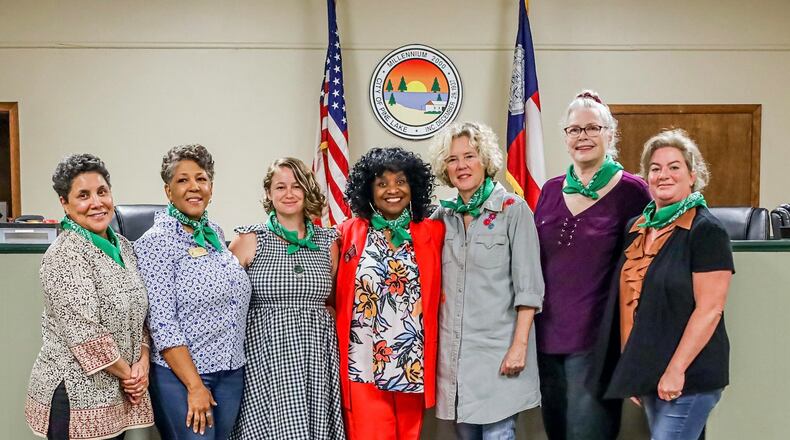It’s hard to imagine that Georgia’s new restrictive abortion law, which criminalizes abortion before most women know they’re pregnant, would have passed the Georgia General Assembly in 2019 had women been in charge.
But you don’t have to imagine what would happen to the law in a city where women are in charge because every leader in tiny Pine Lake is female, from the mayor to the police chief to the municipal court judge, the city clerk and every member of the City Council.
Last week, the mayor and City Council voted to essentially decriminalize abortion there.
Although articles about the little town by the lake (there really is a lake) invariably describe Pine Lake as “quirky,” “funky,” “artsy” or “the city that sprawl forgot,” the women on the City Council there just passed a measure with some serious teeth.
The sweeping local resolution not only bans local funds from going toward recording, investigating or helping with the prosecution of the so-called “heartbeat law,” it also instructs the city’s four police officers not to make arrests, investigate, provide information about or even record reports of miscarriage or abortion.
It also declares that the City Council “supports an individual’s right to choose” and that the council “has a responsibility to protect its residents from any violation of their human rights.”
“There just wasn’t a hesitation,” Mayor Melanie Hammet said of the council meeting where the resolution passed. “I had each individual elected member of our group read a section of the resolution aloud to the room so that every woman would have had her voice on it.”
The language itself originally came from the city’s Democratic state Rep. Viola Davis. In addition to all its local leaders, Pine Lake’s representatives in the Georgia General Assembly are also women, Davis and state Sen. Kim Jackson, who is also a Democrat.
Davis said she presented the resolution to the City Council after working with a coalition of abortion rights advocates and lawmakers after the U.S. Supreme Court overturned Roe v. Wade.
“We were looking for something that was strong and something that would stick out above all others to show that we really want to protect women’s reproductive rights,” she said.
Davis called last week’s vote, which was unanimous, “a united front of justice.”
Jean Bordeaux is one of the five council members who approved the measure.
She describes herself as a “73-year-old lesbian” who retired to Pine Lake with her partner because it felt open to all.
Along with Bordeaux, the council is made up of women who are gay and straight, white, Black, and Latina, and range in age from their 30s to their 70s.
She called the resolution “a stake in the sand.”
“The invasion of privacy that we have seen in laws across the nation should never be a part of law enforcement, and we wanted to make it clear that it will not be so in Pine Lake,” Bordeaux said.
For her part, Davis said she was raised in a family that opposed abortion rights and made it clear to every girl in the family that the family would raise any child that resulted from a pregnancy.
But she said that no matter how the council members felt about abortion individually, they agreed who should make that decision for women.
“We were all in agreement that the overall rights need to rest with women and not necessarily with government officials,” she said. “And I think that coming from women in all the powerful positions in Pine Lake spoke volumes.”
Hammet has been in office for seven years, six-and-a-half of which have featured an all-female council. She described the local politics as liberal, but not identical.
“You can step forward and be who you are,” she said of the city, where three of the past four mayors have been LGBTQ. “It’s just a city where the extraordinary seems ordinary. "
Hammet also said that Pine Lake’s all-female leadership team is the result of women leaders setting up a government where people with or without families can fully participate.
“As you have a group of women in leadership, some of the impediments fall away,” she said.
Young children, either of members or residents, are a frequent addition at City Council meetings. That still makes news in Congress, but it is standard for Pine Lake.
“We don’t call them ‘child-friendly’ meetings. They’re just meetings,” the mayor said. “We don’t address it, we just do it.”
Pine Lake is not the only one that has declared it won’t help the state investigate or prosecute doctors or women under House Bill 481. Leaders in Atlanta, Athens-Clarke County and the city of South Fulton all moved to pass similar resolutions over the past two months.
Republican lawmakers have pointed out that, along with criminal prosecutions for doctors who perform illegal abortions, the law also targets doctors’ medical licenses, which are controlled by the state and not affected by local prosecutions.
And in the early days after HB 481 went into effect, as local district attorneys across the state said they would not prosecute cases under the new law, Republicans in the General Assembly indicated they might consider an addition to the law to require locals to enforce it.
But the enthusiasm among Republicans for strengthening, or even discussing, the restrictive abortion law has drained away as Election Day gets closer and polls show the new law is unpopular.
“I don’t think you could pay people to bring this up right now,” one Republican told me this week.
Nobody had to pay the women in Pine Lake to bring up the state’s abortion ban. They brought it up and passed their best attempt to neuter the law by the time they were done.
About the Author
Keep Reading
The Latest
Featured



